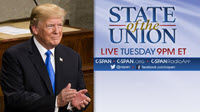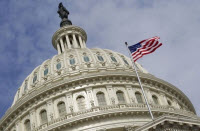
House Speaker Nancy Pelosi (D-CA) and several Democratic chairs are using a surface transportation bill as a base for a broader $1.5 trillion infrastructure plan they announced yesterday, to also invest in the nation’s housing, water, broadband, clean energy, and education systems. (POLITICO, June 18 – see also Pelosi remarks and Youtube video, June 18).
- Action on transportation infrastructure is considered a “must-do” item in Congress before the November elections because the nation’s main source to fund roads, bridges, and mass transit – the Highway Trust Fund – expires on September 30. (New York Times, June 17)
- The Democratic surface transportation piece – the INVEST in America Act – would authorize $494 billion in spending over five years. Key elements of this bill align with Roundtable policies, such as state/local cost share allocations that would help finance significant projects like the Northeast Corridor Gateway Program. (Roundtable Weekly, June 5 and Bill text | Factsheet | Bill Summary | Section-by-Section)
- Meanwhile, the Ranking Member on the House Transportation and Infrastructure Committee, Sam Graves (R-MO), announced an alternative bill for surface transportation programs. The Republicans’ STARTER Act (section-by-section summary) would bolster permit streamlining and the “One Federal Decision” framework, measures long-supported by The Roundtable. (Roundtable Weekly, August 2, 2019)
- Pelosi said yesterday that the comprehensive Democratic infrastructure package – the Moving Forward Act – would “make real the promise of building infrastructure in a green and resilient way,” and that “[i]t’s job-creating in its essence, but also commerce-promoting.” (The Hill, June 18). A framework for the omnibus measure was released in January. (Roundtable Weekly, January 31)
- The critical issue with any infrastructure proposal is how to pay for it. House Ways and Means (W&M) Committee Chairman Richard Neal (D-MA) yesterday outlined several tax provisions to be included in the Democratic leadership’s measure.
- Neal stated, “We leaned on our tax code and will reinstate Build America Bonds, to not only provide financing to state and local governments but also spur investment in the private sector,” according to a W&M Committee press release. “There is a desperate need for modernizing low-income housing, and the Committee proposed a massive expansion of the Low Income Housing Tax Credit to get us there.” A W&M fact sheet outlines other provisions.
- The Senate is expected to focus on infrastructure in the coming weeks after the House acts. Last summer, the Senate Environment and Public Works Committee (EPW) unanimously approved a five-year, $287 billion surface transportation plan. (Roundtable Weekly, August 2, 2019).
The Trump Administration has long stated that infrastructure is one of its top priorities. It is reportedly preparing another $1 trillion plan that it may present to Congress next month. (Bloomberg, June 16) Pelosi said yesterday she anticipates the Democratic Moving Forward Act will come to a House vote before Congress breaks for the July 4th recess and urged the Administration to begin negotiations about funding it.
# # #











